Lecture_2_2013.ppt
- Количество слайдов: 39
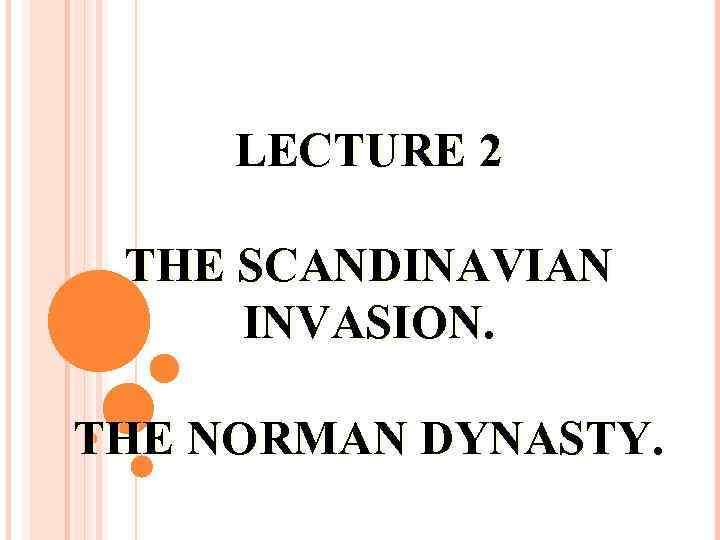 LECTURE 2 THE SCANDINAVIAN INVASION. THE NORMAN DYNASTY.
LECTURE 2 THE SCANDINAVIAN INVASION. THE NORMAN DYNASTY.
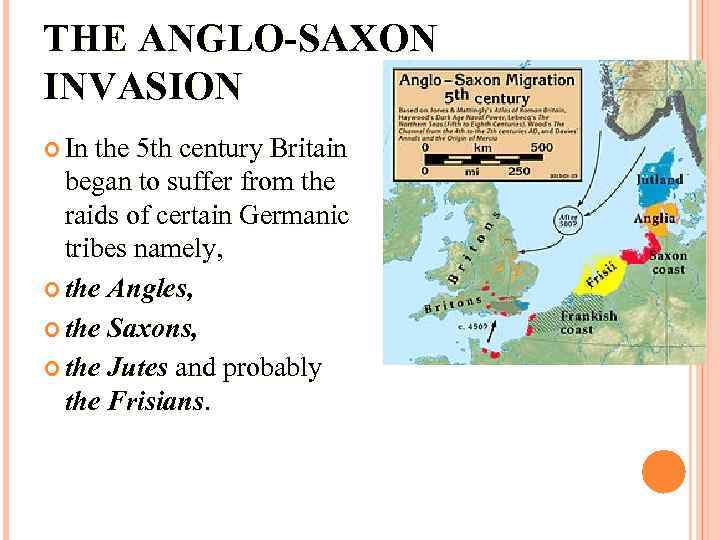 THE ANGLO-SAXON INVASION In the 5 th century Britain began to suffer from the raids of certain Germanic tribes namely, the Angles, the Saxons, the Jutes and probably the Frisians.
THE ANGLO-SAXON INVASION In the 5 th century Britain began to suffer from the raids of certain Germanic tribes namely, the Angles, the Saxons, the Jutes and probably the Frisians.
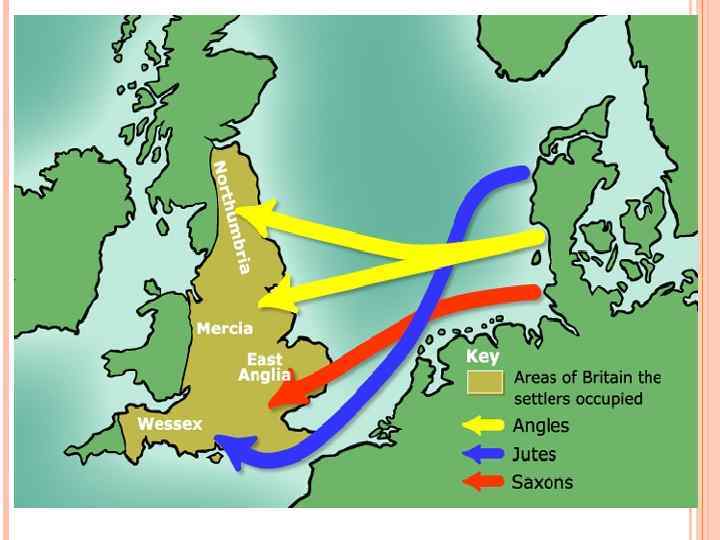
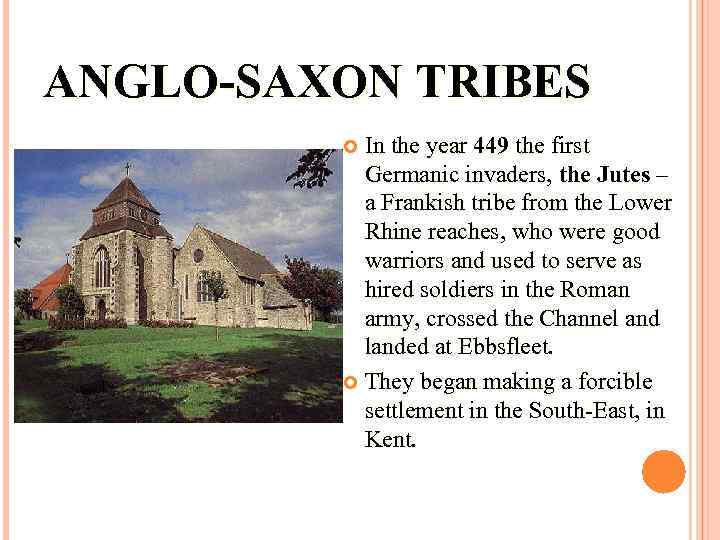 ANGLO-SAXON TRIBES In the year 449 the first Germanic invaders, the Jutes – a Frankish tribe from the Lower Rhine reaches, who were good warriors and used to serve as hired soldiers in the Roman army, crossed the Channel and landed at Ebbsfleet. They began making a forcible settlement in the South-East, in Kent.
ANGLO-SAXON TRIBES In the year 449 the first Germanic invaders, the Jutes – a Frankish tribe from the Lower Rhine reaches, who were good warriors and used to serve as hired soldiers in the Roman army, crossed the Channel and landed at Ebbsfleet. They began making a forcible settlement in the South-East, in Kent.
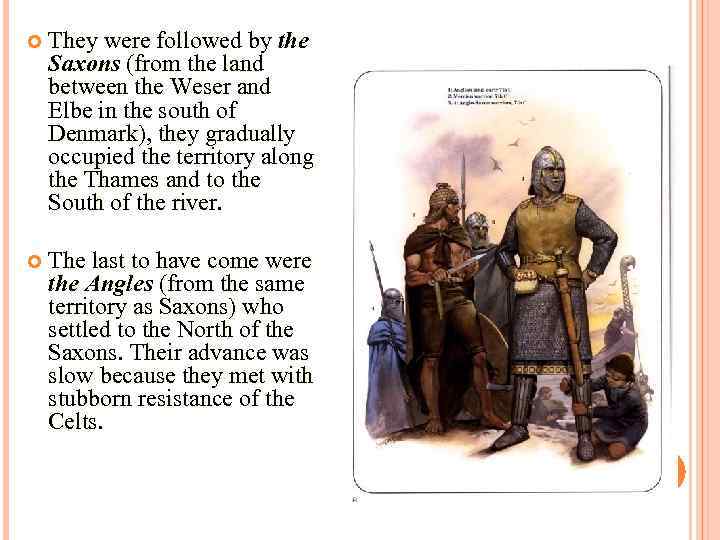 They were followed by the Saxons (from the land between the Weser and Elbe in the south of Denmark), they gradually occupied the territory along the Thames and to the South of the river. The last to have come were the Angles (from the same territory as Saxons) who settled to the North of the Saxons. Their advance was slow because they met with stubborn resistance of the Celts.
They were followed by the Saxons (from the land between the Weser and Elbe in the south of Denmark), they gradually occupied the territory along the Thames and to the South of the river. The last to have come were the Angles (from the same territory as Saxons) who settled to the North of the Saxons. Their advance was slow because they met with stubborn resistance of the Celts.
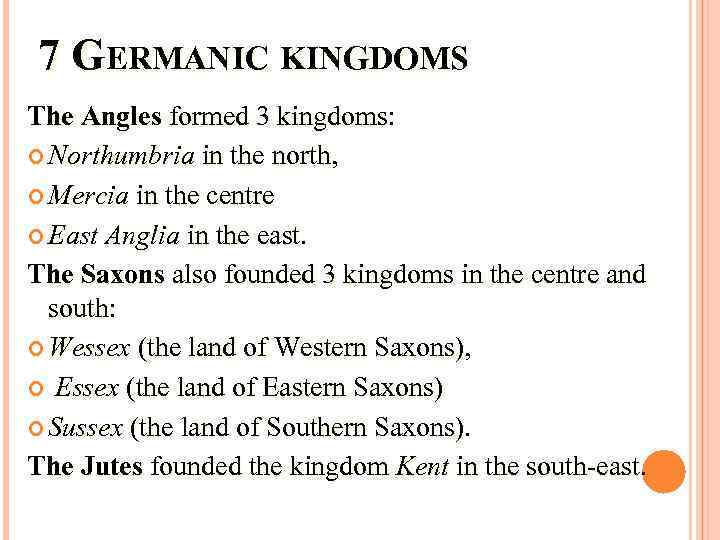 7 GERMANIC KINGDOMS The Angles formed 3 kingdoms: Northumbria in the north, Mercia in the centre East Anglia in the east. The Saxons also founded 3 kingdoms in the centre and south: Wessex (the land of Western Saxons), Essex (the land of Eastern Saxons) Sussex (the land of Southern Saxons). The Jutes founded the kingdom Kent in the south-east.
7 GERMANIC KINGDOMS The Angles formed 3 kingdoms: Northumbria in the north, Mercia in the centre East Anglia in the east. The Saxons also founded 3 kingdoms in the centre and south: Wessex (the land of Western Saxons), Essex (the land of Eastern Saxons) Sussex (the land of Southern Saxons). The Jutes founded the kingdom Kent in the south-east.
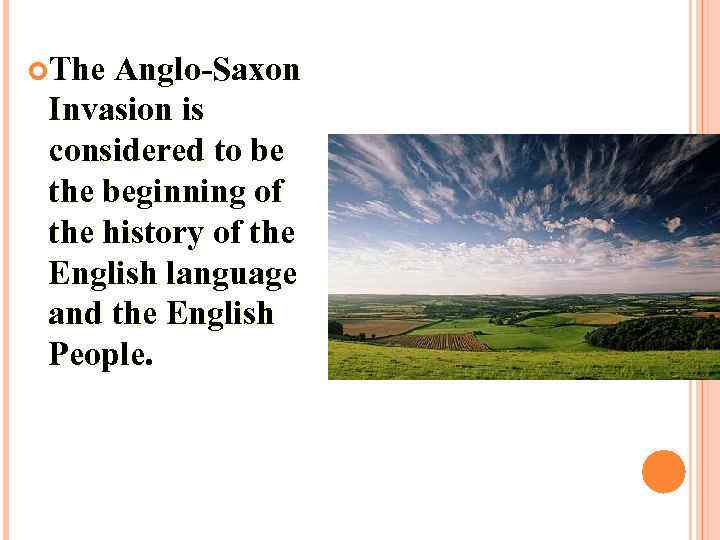 The Anglo-Saxon Invasion is considered to be the beginning of the history of the English language and the English People.
The Anglo-Saxon Invasion is considered to be the beginning of the history of the English language and the English People.
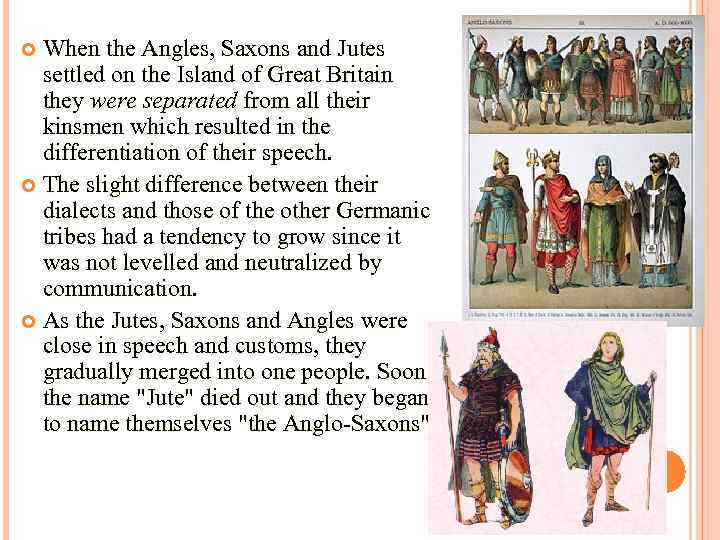 When the Angles, Saxons and Jutes settled on the Island of Great Britain they were separated from all their kinsmen which resulted in the differentiation of their speech. The slight difference between their dialects and those of the other Germanic tribes had a tendency to grow since it was not levelled and neutralized by communication. As the Jutes, Saxons and Angles were close in speech and customs, they gradually merged into one people. Soon the name "Jute" died out and they began to name themselves "the Anglo-Saxons".
When the Angles, Saxons and Jutes settled on the Island of Great Britain they were separated from all their kinsmen which resulted in the differentiation of their speech. The slight difference between their dialects and those of the other Germanic tribes had a tendency to grow since it was not levelled and neutralized by communication. As the Jutes, Saxons and Angles were close in speech and customs, they gradually merged into one people. Soon the name "Jute" died out and they began to name themselves "the Anglo-Saxons".
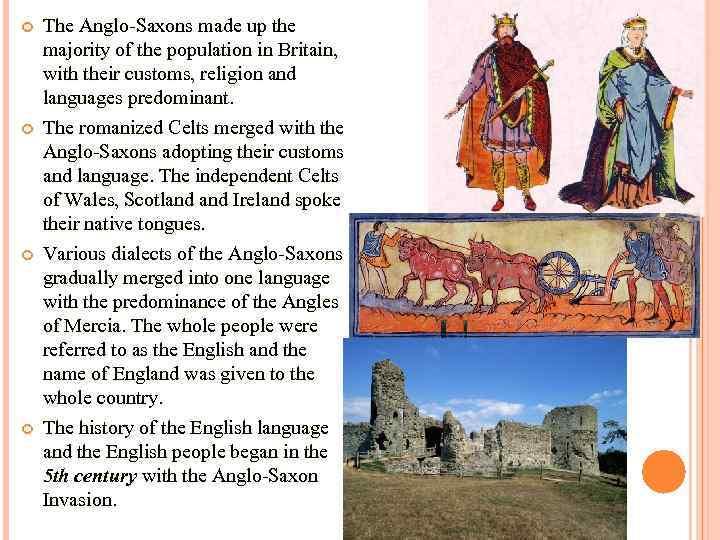 The Anglo-Saxons made up the majority of the population in Britain, with their customs, religion and languages predominant. The romanized Celts merged with the Anglo-Saxons adopting their customs and language. The independent Celts of Wales, Scotland Ireland spoke their native tongues. Various dialects of the Anglo-Saxons gradually merged into one language with the predominance of the Angles of Mercia. The whole people were referred to as the English and the name of England was given to the whole country. The history of the English language and the English people began in the 5 th century with the Anglo-Saxon Invasion.
The Anglo-Saxons made up the majority of the population in Britain, with their customs, religion and languages predominant. The romanized Celts merged with the Anglo-Saxons adopting their customs and language. The independent Celts of Wales, Scotland Ireland spoke their native tongues. Various dialects of the Anglo-Saxons gradually merged into one language with the predominance of the Angles of Mercia. The whole people were referred to as the English and the name of England was given to the whole country. The history of the English language and the English people began in the 5 th century with the Anglo-Saxon Invasion.
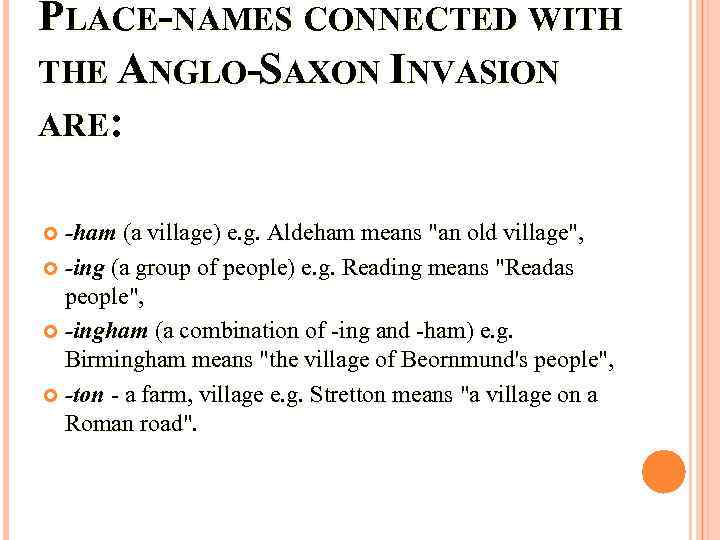 PLACE-NAMES CONNECTED WITH THE ANGLO-SAXON INVASION ARE: -ham (a village) e. g. Aldeham means "an old village", -ing (a group of people) e. g. Reading means "Readas people", -ingham (a combination of -ing and -ham) e. g. Birmingham means "the village of Beornmund's people", -ton - a farm, village e. g. Stretton means "a village on a Roman road".
PLACE-NAMES CONNECTED WITH THE ANGLO-SAXON INVASION ARE: -ham (a village) e. g. Aldeham means "an old village", -ing (a group of people) e. g. Reading means "Readas people", -ingham (a combination of -ing and -ham) e. g. Birmingham means "the village of Beornmund's people", -ton - a farm, village e. g. Stretton means "a village on a Roman road".
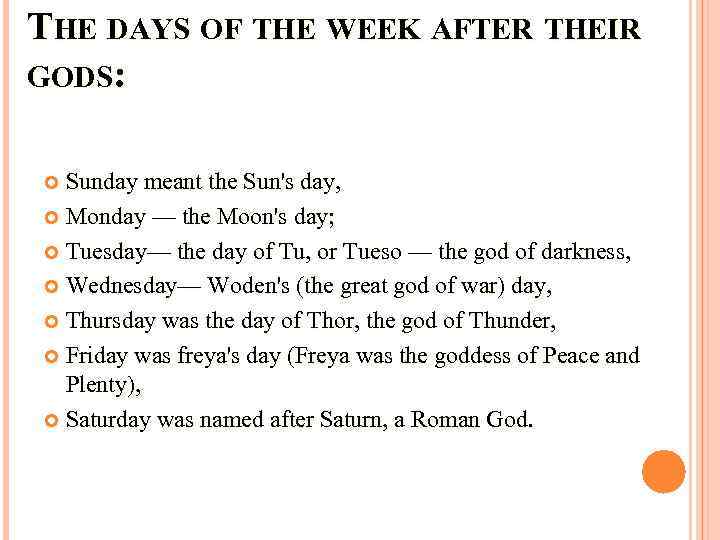 THE DAYS OF THE WEEK AFTER THEIR GODS: Sunday meant the Sun's day, Monday — the Moon's day; Tuesday— the day of Tu, or Tueso — the god of darkness, Wednesday— Woden's (the great god of war) day, Thursday was the day of Thor, the god of Thunder, Friday was freya's day (Freya was the goddess of Peace and Plenty), Saturday was named after Saturn, a Roman God.
THE DAYS OF THE WEEK AFTER THEIR GODS: Sunday meant the Sun's day, Monday — the Moon's day; Tuesday— the day of Tu, or Tueso — the god of darkness, Wednesday— Woden's (the great god of war) day, Thursday was the day of Thor, the god of Thunder, Friday was freya's day (Freya was the goddess of Peace and Plenty), Saturday was named after Saturn, a Roman God.
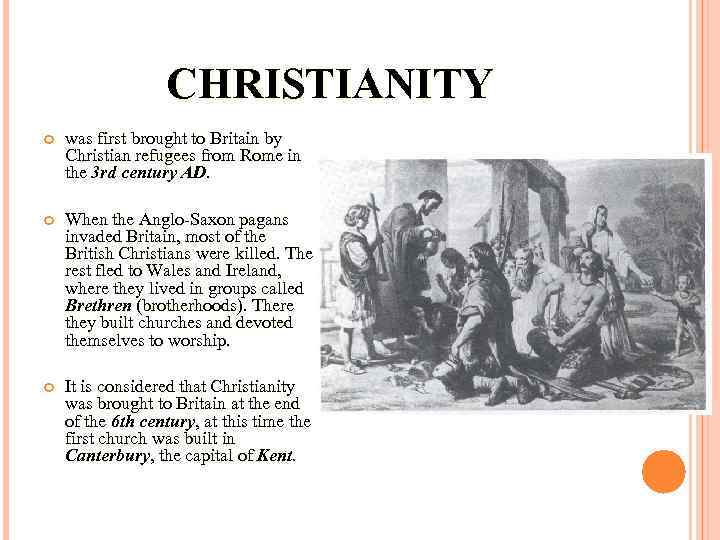 CHRISTIANITY was first brought to Britain by Christian refugees from Rome in the 3 rd century AD. When the Anglo-Saxon pagans invaded Britain, most of the British Christians were killed. The rest fled to Wales and Ireland, where they lived in groups called Brethren (brotherhoods). There they built churches and devoted themselves to worship. It is considered that Christianity was brought to Britain at the end of the 6 th century, at this time the first church was built in Canterbury, the capital of Kent.
CHRISTIANITY was first brought to Britain by Christian refugees from Rome in the 3 rd century AD. When the Anglo-Saxon pagans invaded Britain, most of the British Christians were killed. The rest fled to Wales and Ireland, where they lived in groups called Brethren (brotherhoods). There they built churches and devoted themselves to worship. It is considered that Christianity was brought to Britain at the end of the 6 th century, at this time the first church was built in Canterbury, the capital of Kent.
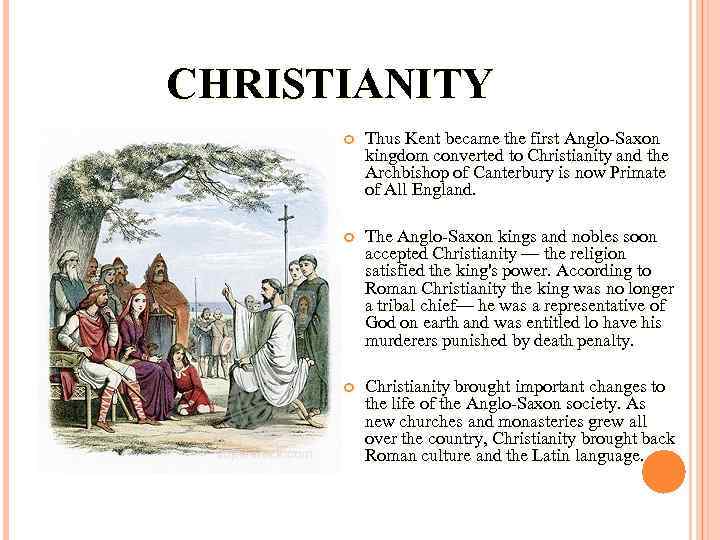 CHRISTIANITY Thus Kent became the first Anglo-Saxon kingdom converted to Christianity and the Archbishop of Canterbury is now Primate of All England. The Anglo-Saxon kings and nobles soon accepted Christianity — the religion satisfied the king's power. According to Roman Christianity the king was no longer a tribal chief— he was a representative of God on earth and was entitled lo have his murderers punished by death penalty. Christianity brought important changes to the life of the Anglo-Saxon society. As new churches and monasteries grew all over the country, Christianity brought back Roman culture and the Latin language.
CHRISTIANITY Thus Kent became the first Anglo-Saxon kingdom converted to Christianity and the Archbishop of Canterbury is now Primate of All England. The Anglo-Saxon kings and nobles soon accepted Christianity — the religion satisfied the king's power. According to Roman Christianity the king was no longer a tribal chief— he was a representative of God on earth and was entitled lo have his murderers punished by death penalty. Christianity brought important changes to the life of the Anglo-Saxon society. As new churches and monasteries grew all over the country, Christianity brought back Roman culture and the Latin language.
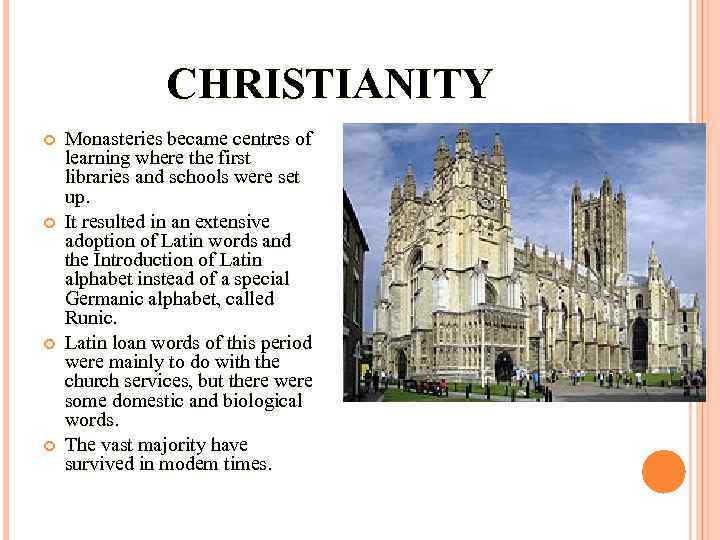 CHRISTIANITY Monasteries became centres of learning where the first libraries and schools were set up. It resulted in an extensive adoption of Latin words and the Introduction of Latin alphabet instead of a special Germanic alphabet, called Runic. Latin loan words of this period were mainly to do with the church services, but there were some domestic and biological words. The vast majority have survived in modem times.
CHRISTIANITY Monasteries became centres of learning where the first libraries and schools were set up. It resulted in an extensive adoption of Latin words and the Introduction of Latin alphabet instead of a special Germanic alphabet, called Runic. Latin loan words of this period were mainly to do with the church services, but there were some domestic and biological words. The vast majority have survived in modem times.
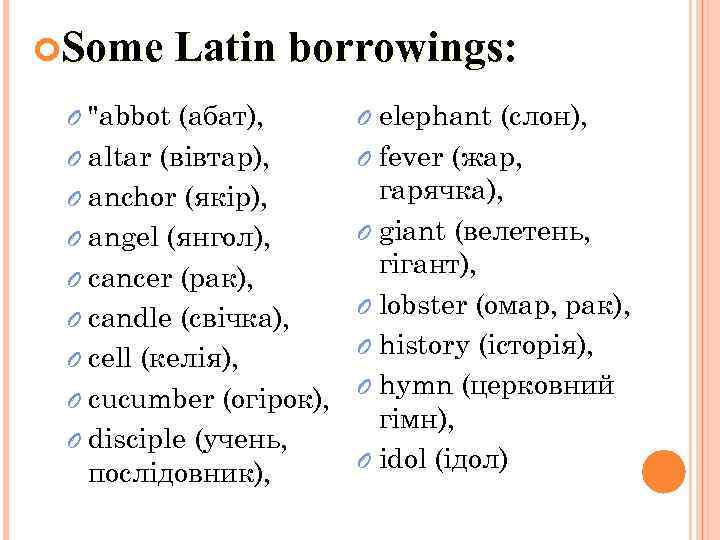 Some Latin borrowings: O "abbot (абат), O elephant (слон), O altar (вівтар), O fever (жар, гарячка), O giant (велетень, O angel (янгол), гігант), O cancer (рак), O lobster (омар, рак), O candle (свічка), O history (історія), O cell (келія), O hymn (церковний O cucumber (огірок), гімн), O disciple (учень, O idol (ідол) послідовник), O anchor (якір),
Some Latin borrowings: O "abbot (абат), O elephant (слон), O altar (вівтар), O fever (жар, гарячка), O giant (велетень, O angel (янгол), гігант), O cancer (рак), O lobster (омар, рак), O candle (свічка), O history (історія), O cell (келія), O hymn (церковний O cucumber (огірок), гімн), O disciple (учень, O idol (ідол) послідовник), O anchor (якір),
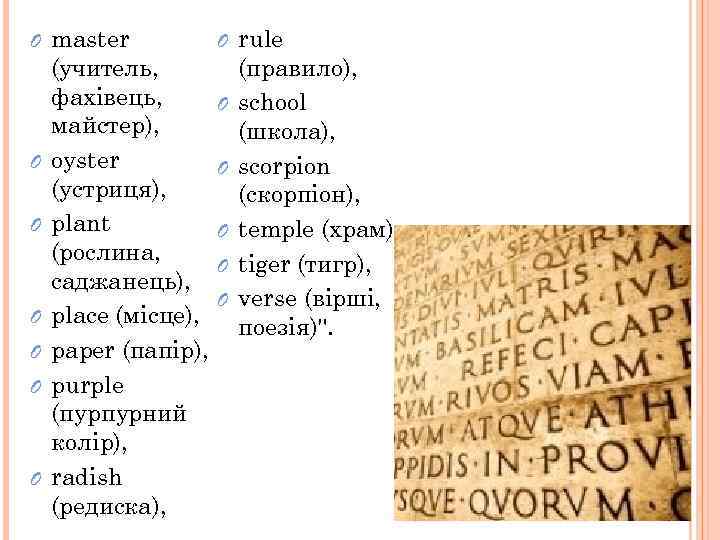 O master O O O (учитель, фахівець, майстер), oyster (устриця), plant (рослина, саджанець), place (місце), paper (папір), purple (пурпурний колір), radish (редиска), O rule O O O (правило), school (школа), scorpion (скорпіон), temple (храм), tiger (тигр), verse (вірші, поезія)".
O master O O O (учитель, фахівець, майстер), oyster (устриця), plant (рослина, саджанець), place (місце), paper (папір), purple (пурпурний колір), radish (редиска), O rule O O O (правило), school (школа), scorpion (скорпіон), temple (храм), tiger (тигр), verse (вірші, поезія)".
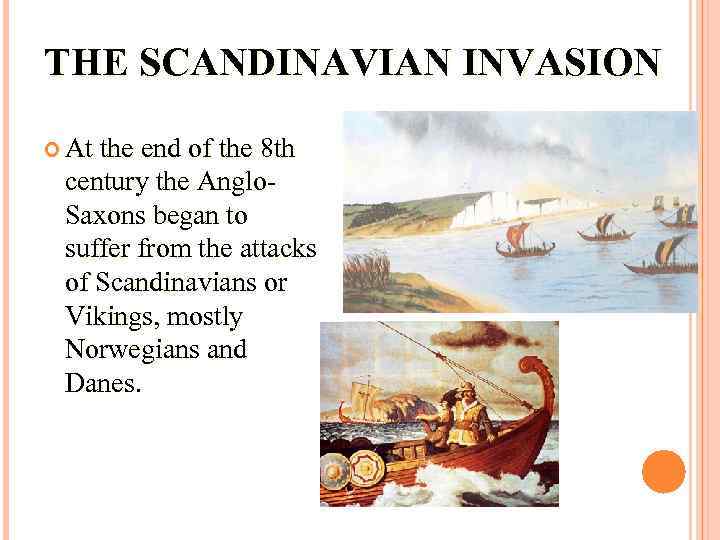 THE SCANDINAVIAN INVASION At the end of the 8 th century the Anglo. Saxons began to suffer from the attacks of Scandinavians or Vikings, mostly Norwegians and Danes.
THE SCANDINAVIAN INVASION At the end of the 8 th century the Anglo. Saxons began to suffer from the attacks of Scandinavians or Vikings, mostly Norwegians and Danes.
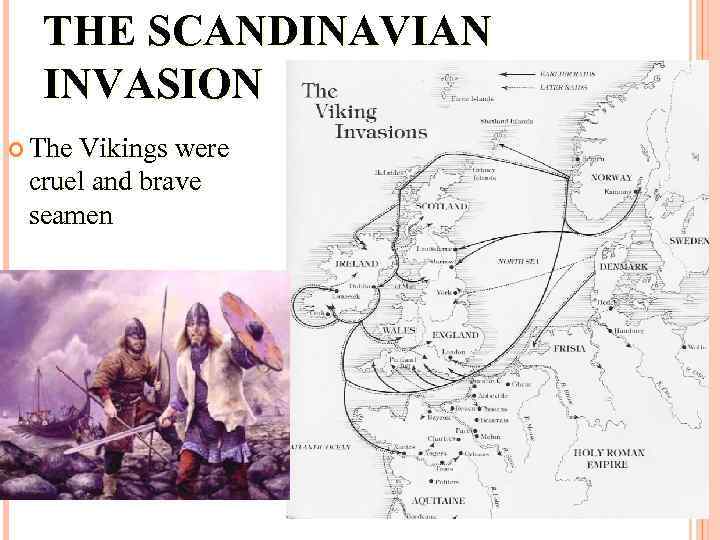 THE SCANDINAVIAN INVASION The Vikings were cruel and brave seamen
THE SCANDINAVIAN INVASION The Vikings were cruel and brave seamen
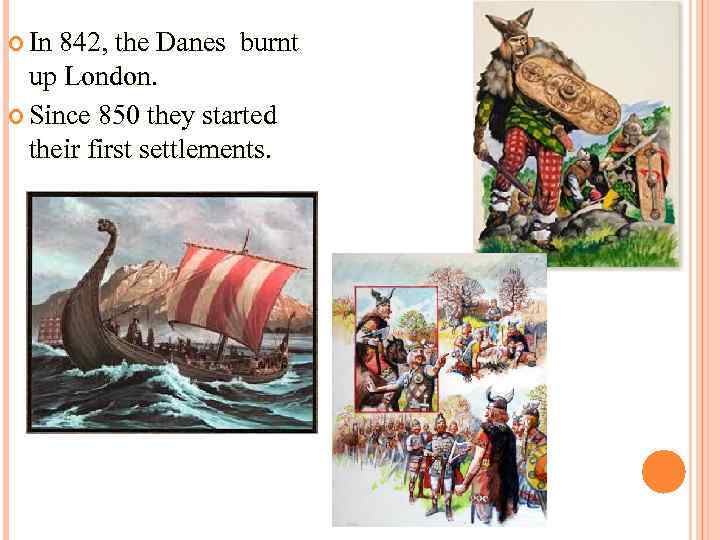 In 842, the Danes burnt up London. Since 850 they started their first settlements.
In 842, the Danes burnt up London. Since 850 they started their first settlements.
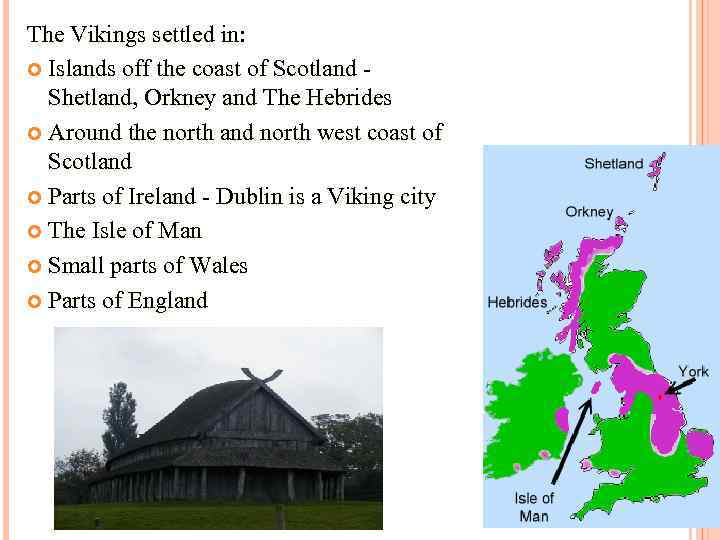 The Vikings settled in: Islands off the coast of Scotland Shetland, Orkney and The Hebrides Around the north and north west coast of Scotland Parts of Ireland - Dublin is a Viking city The Isle of Man Small parts of Wales Parts of England
The Vikings settled in: Islands off the coast of Scotland Shetland, Orkney and The Hebrides Around the north and north west coast of Scotland Parts of Ireland - Dublin is a Viking city The Isle of Man Small parts of Wales Parts of England
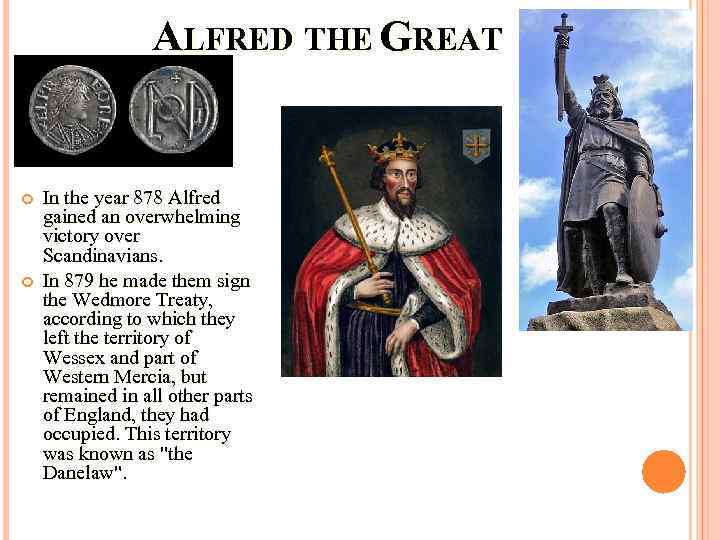 ALFRED THE GREAT In the year 878 Alfred gained an overwhelming victory over Scandinavians. In 879 he made them sign the Wedmore Treaty, according to which they left the territory of Wessex and part of Western Mercia, but remained in all other parts of England, they had occupied. This territory was known as "the Danelaw".
ALFRED THE GREAT In the year 878 Alfred gained an overwhelming victory over Scandinavians. In 879 he made them sign the Wedmore Treaty, according to which they left the territory of Wessex and part of Western Mercia, but remained in all other parts of England, they had occupied. This territory was known as "the Danelaw".
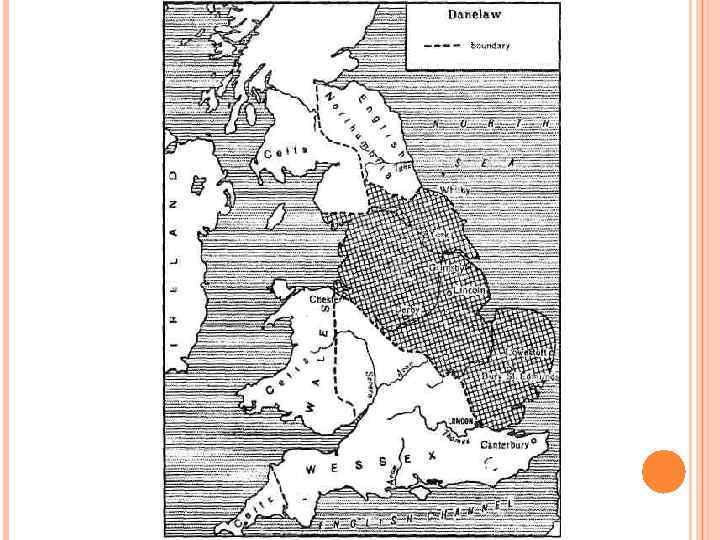
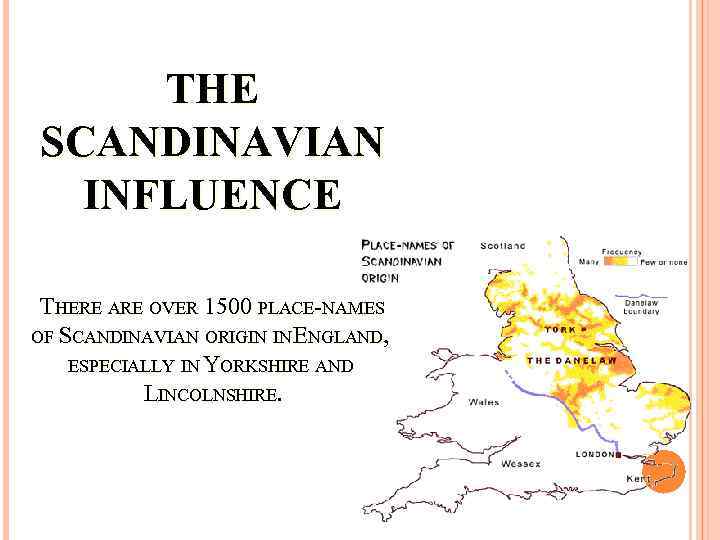 THE SCANDINAVIAN INFLUENCE THERE ARE OVER 1500 PLACE-NAMES OF SCANDINAVIAN ORIGIN IN ENGLAND, ESPECIALLY IN YORKSHIRE AND LINCOLNSHIRE.
THE SCANDINAVIAN INFLUENCE THERE ARE OVER 1500 PLACE-NAMES OF SCANDINAVIAN ORIGIN IN ENGLAND, ESPECIALLY IN YORKSHIRE AND LINCOLNSHIRE.
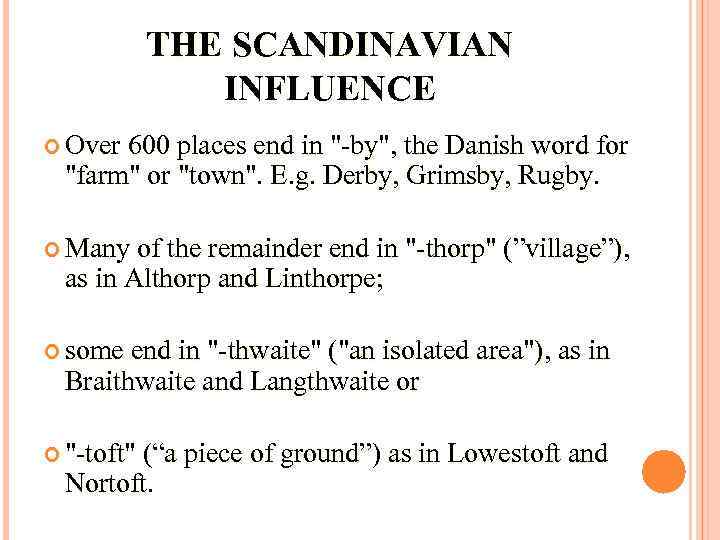 THE SCANDINAVIAN INFLUENCE Over 600 places end in "-by", the Danish word for "farm" or "town". E. g. Derby, Grimsby, Rugby. Many of the remainder end in "-thorp" (”village”), as in Althorp and Linthorpe; some end in "-thwaite" ("an isolated area"), as in Braithwaite and Langthwaite or "-toft" (“a piece of ground”) as in Lowestoft and Nortoft.
THE SCANDINAVIAN INFLUENCE Over 600 places end in "-by", the Danish word for "farm" or "town". E. g. Derby, Grimsby, Rugby. Many of the remainder end in "-thorp" (”village”), as in Althorp and Linthorpe; some end in "-thwaite" ("an isolated area"), as in Braithwaite and Langthwaite or "-toft" (“a piece of ground”) as in Lowestoft and Nortoft.
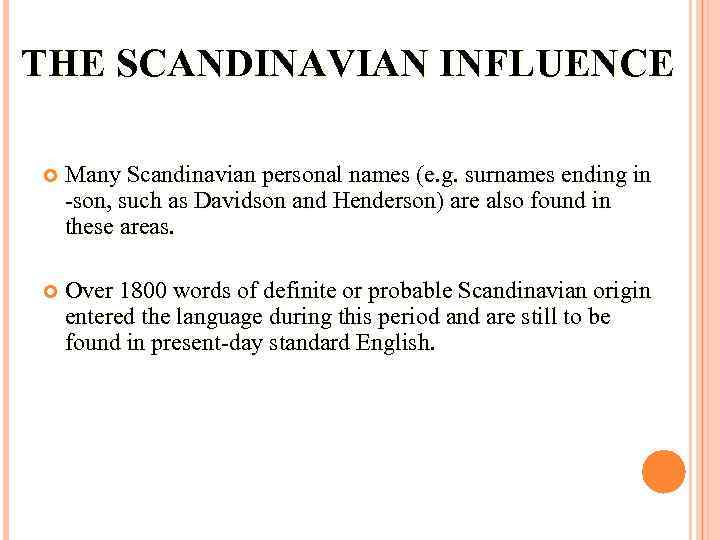 THE SCANDINAVIAN INFLUENCE Many Scandinavian personal names (e. g. surnames ending in -son, such as Davidson and Henderson) are also found in these areas. Over 1800 words of definite or probable Scandinavian origin entered the language during this period and are still to be found in present-day standard English.
THE SCANDINAVIAN INFLUENCE Many Scandinavian personal names (e. g. surnames ending in -son, such as Davidson and Henderson) are also found in these areas. Over 1800 words of definite or probable Scandinavian origin entered the language during this period and are still to be found in present-day standard English.
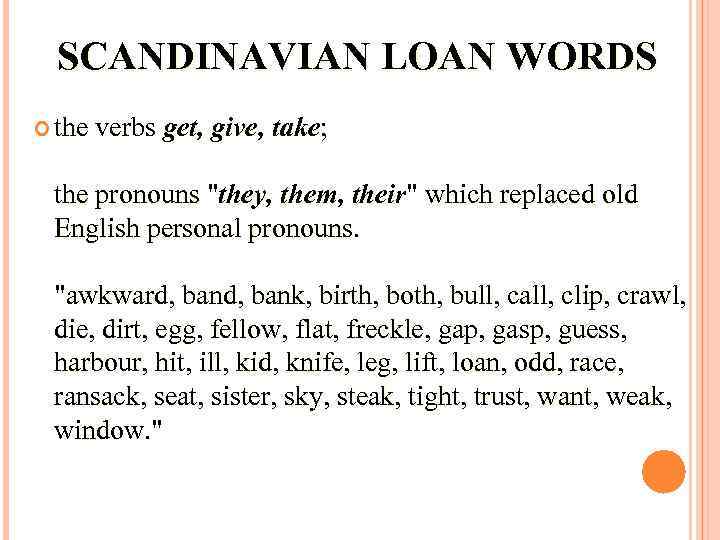 SCANDINAVIAN LOAN WORDS the verbs get, give, take; the pronouns "they, them, their" which replaced old English personal pronouns. "awkward, bank, birth, both, bull, call, clip, crawl, die, dirt, egg, fellow, flat, freckle, gap, gasp, guess, harbour, hit, ill, kid, knife, leg, lift, loan, odd, race, ransack, seat, sister, sky, steak, tight, trust, want, weak, window. "
SCANDINAVIAN LOAN WORDS the verbs get, give, take; the pronouns "they, them, their" which replaced old English personal pronouns. "awkward, bank, birth, both, bull, call, clip, crawl, die, dirt, egg, fellow, flat, freckle, gap, gasp, guess, harbour, hit, ill, kid, knife, leg, lift, loan, odd, race, ransack, seat, sister, sky, steak, tight, trust, want, weak, window. "
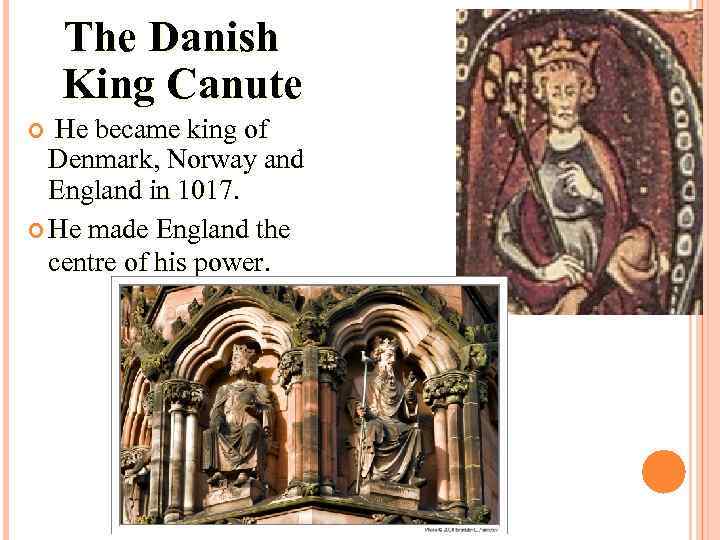 The Danish King Canute He became king of Denmark, Norway and England in 1017. He made England the centre of his power.
The Danish King Canute He became king of Denmark, Norway and England in 1017. He made England the centre of his power.
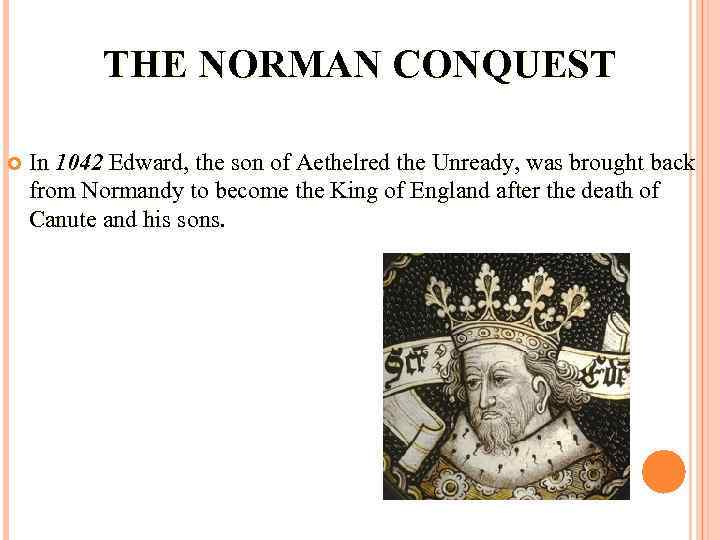 THE NORMAN CONQUEST In 1042 Edward, the son of Aethelred the Unready, was brought back from Normandy to become the King of England after the death of Canute and his sons.
THE NORMAN CONQUEST In 1042 Edward, the son of Aethelred the Unready, was brought back from Normandy to become the King of England after the death of Canute and his sons.
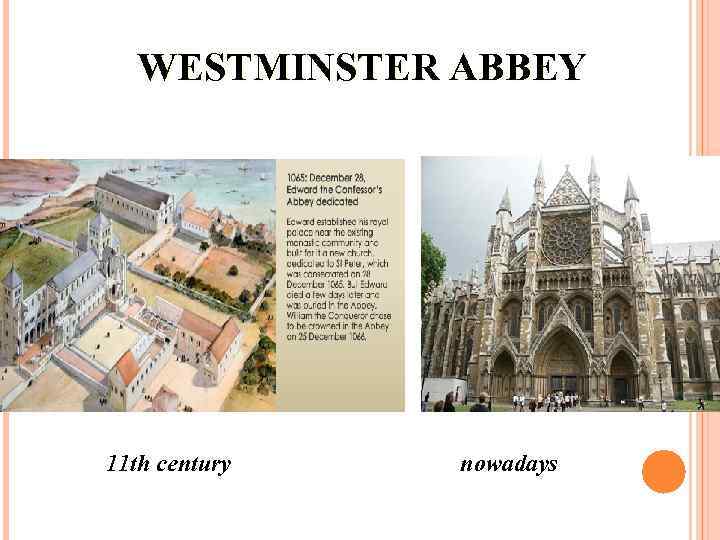 WESTMINSTER ABBEY 11 th century nowadays
WESTMINSTER ABBEY 11 th century nowadays
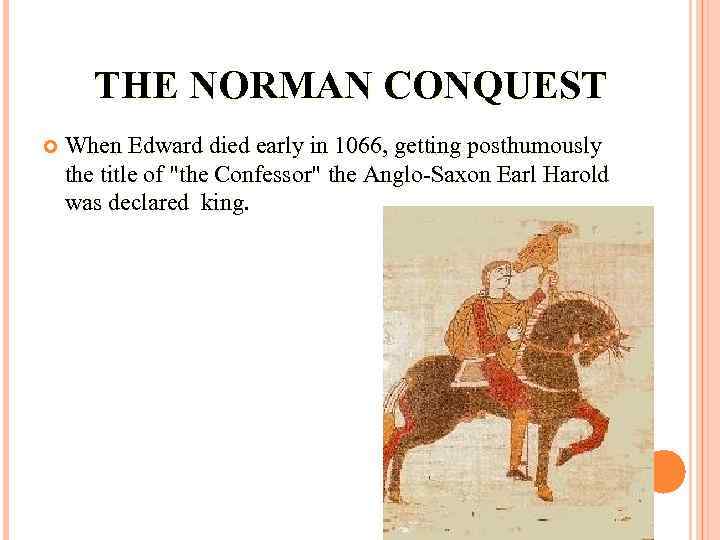 THE NORMAN CONQUEST When Edward died early in 1066, getting posthumously the title of "the Confessor" the Anglo-Saxon Earl Harold was declared king.
THE NORMAN CONQUEST When Edward died early in 1066, getting posthumously the title of "the Confessor" the Anglo-Saxon Earl Harold was declared king.
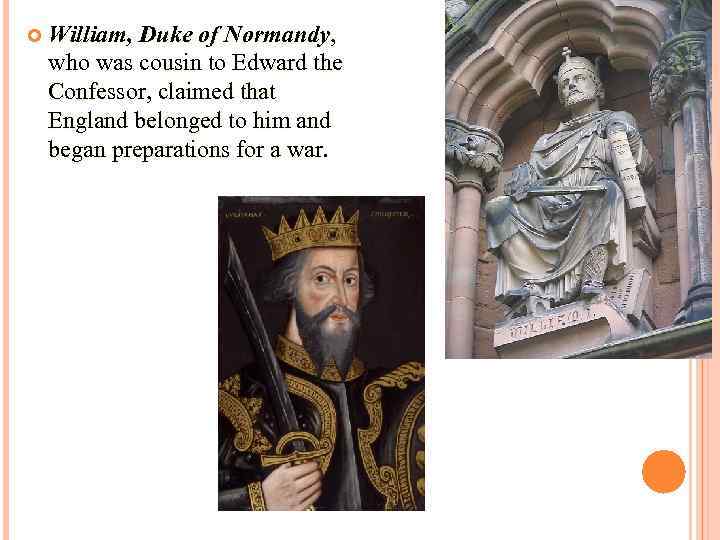 William, Duke of Normandy, who was cousin to Edward the Confessor, claimed that England belonged to him and began preparations for a war.
William, Duke of Normandy, who was cousin to Edward the Confessor, claimed that England belonged to him and began preparations for a war.
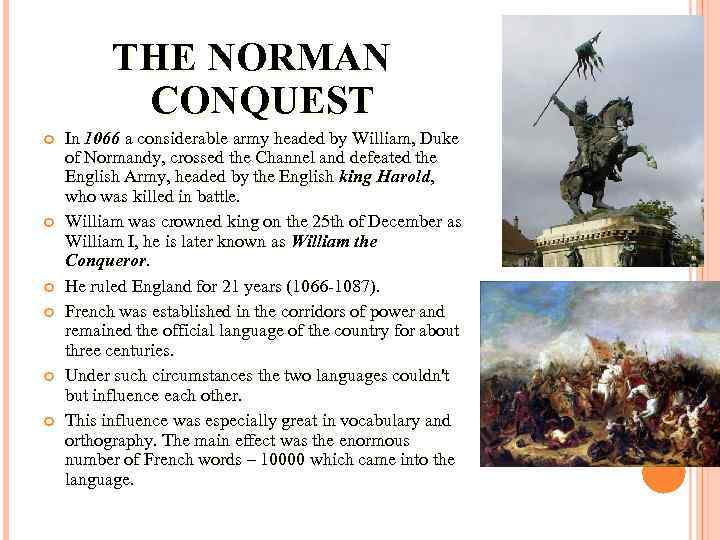 THE NORMAN CONQUEST In 1066 a considerable army headed by William, Duke of Normandy, crossed the Channel and defeated the English Army, headed by the English king Harold, who was killed in battle. William was crowned king on the 25 th of December as William I, he is later known as William the Conqueror. He ruled England for 21 years (1066 -1087). French was established in the corridors of power and remained the official language of the country for about three centuries. Under such circumstances the two languages couldn't but influence each other. This influence was especially great in vocabulary and orthography. The main effect was the enormous number of French words – 10000 which came into the language.
THE NORMAN CONQUEST In 1066 a considerable army headed by William, Duke of Normandy, crossed the Channel and defeated the English Army, headed by the English king Harold, who was killed in battle. William was crowned king on the 25 th of December as William I, he is later known as William the Conqueror. He ruled England for 21 years (1066 -1087). French was established in the corridors of power and remained the official language of the country for about three centuries. Under such circumstances the two languages couldn't but influence each other. This influence was especially great in vocabulary and orthography. The main effect was the enormous number of French words – 10000 which came into the language.
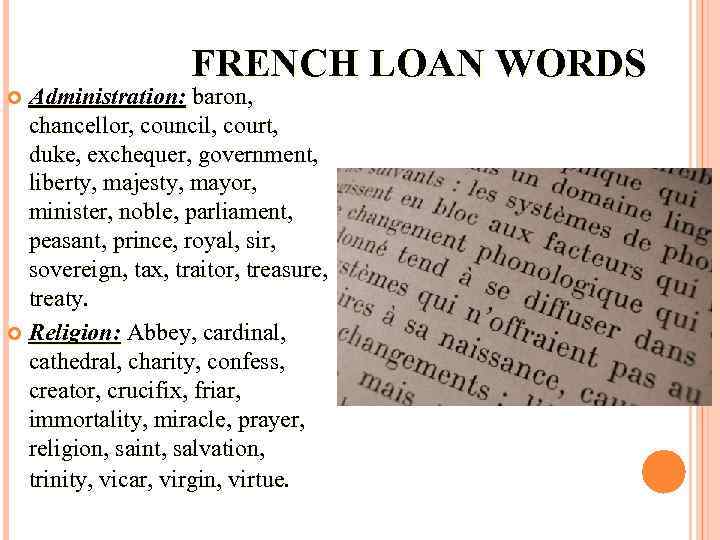 FRENCH LOAN WORDS Administration: baron, chancellor, council, court, duke, exchequer, government, liberty, majesty, mayor, minister, noble, parliament, peasant, prince, royal, sir, sovereign, tax, traitor, treasure, treaty. Religion: Abbey, cardinal, cathedral, charity, confess, creator, crucifix, friar, immortality, miracle, prayer, religion, saint, salvation, trinity, vicar, virgin, virtue.
FRENCH LOAN WORDS Administration: baron, chancellor, council, court, duke, exchequer, government, liberty, majesty, mayor, minister, noble, parliament, peasant, prince, royal, sir, sovereign, tax, traitor, treasure, treaty. Religion: Abbey, cardinal, cathedral, charity, confess, creator, crucifix, friar, immortality, miracle, prayer, religion, saint, salvation, trinity, vicar, virgin, virtue.
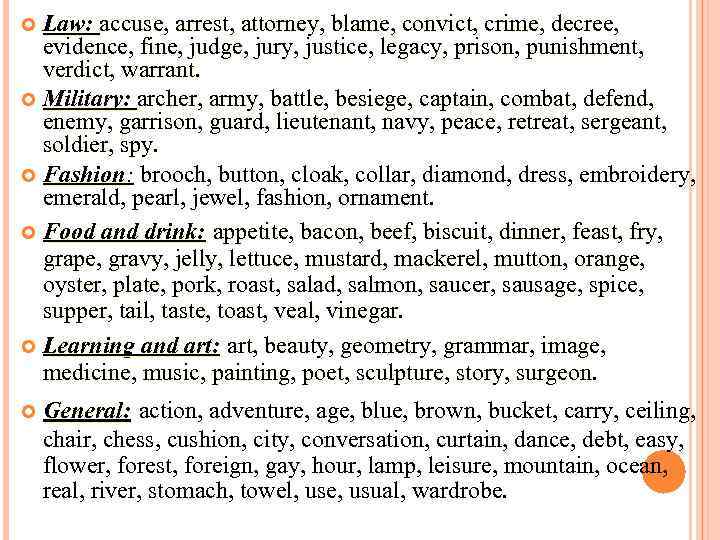 Law: accuse, arrest, attorney, blame, convict, crime, decree, evidence, fine, judge, jury, justice, legacy, prison, punishment, verdict, warrant. Military: archer, army, battle, besiege, captain, combat, defend, enemy, garrison, guard, lieutenant, navy, peace, retreat, sergeant, soldier, spy. Fashion: brooch, button, cloak, collar, diamond, dress, embroidery, Fashion emerald, pearl, jewel, fashion, ornament. Food and drink: appetite, bacon, beef, biscuit, dinner, feast, fry, grape, gravy, jelly, lettuce, mustard, mackerel, mutton, orange, oyster, plate, pork, roast, salad, salmon, saucer, sausage, spice, supper, tail, taste, toast, veal, vinegar. Learning and art: art, beauty, geometry, grammar, image, medicine, music, painting, poet, sculpture, story, surgeon. General: action, adventure, age, blue, brown, bucket, carry, ceiling, chair, chess, cushion, city, conversation, curtain, dance, debt, easy, flower, forest, foreign, gay, hour, lamp, leisure, mountain, ocean, real, river, stomach, towel, use, usual, wardrobe.
Law: accuse, arrest, attorney, blame, convict, crime, decree, evidence, fine, judge, jury, justice, legacy, prison, punishment, verdict, warrant. Military: archer, army, battle, besiege, captain, combat, defend, enemy, garrison, guard, lieutenant, navy, peace, retreat, sergeant, soldier, spy. Fashion: brooch, button, cloak, collar, diamond, dress, embroidery, Fashion emerald, pearl, jewel, fashion, ornament. Food and drink: appetite, bacon, beef, biscuit, dinner, feast, fry, grape, gravy, jelly, lettuce, mustard, mackerel, mutton, orange, oyster, plate, pork, roast, salad, salmon, saucer, sausage, spice, supper, tail, taste, toast, veal, vinegar. Learning and art: art, beauty, geometry, grammar, image, medicine, music, painting, poet, sculpture, story, surgeon. General: action, adventure, age, blue, brown, bucket, carry, ceiling, chair, chess, cushion, city, conversation, curtain, dance, debt, easy, flower, forest, foreign, gay, hour, lamp, leisure, mountain, ocean, real, river, stomach, towel, use, usual, wardrobe.
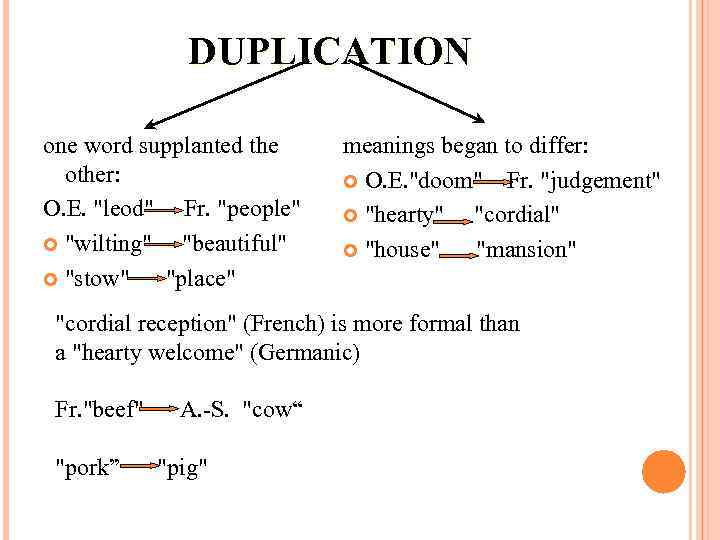 DUPLICATION one word supplanted the other: O. E. "leod" Fr. "people" "wilting" "beautiful" "stow" "place" meanings began to differ: O. E. "doom" Fr. "judgement" "hearty" "cordial" "house" "mansion" "cordial reception" (French) is more formal than a "hearty welcome" (Germanic) Fr. "beef" "pork” A. -S. "cow“ "pig"
DUPLICATION one word supplanted the other: O. E. "leod" Fr. "people" "wilting" "beautiful" "stow" "place" meanings began to differ: O. E. "doom" Fr. "judgement" "hearty" "cordial" "house" "mansion" "cordial reception" (French) is more formal than a "hearty welcome" (Germanic) Fr. "beef" "pork” A. -S. "cow“ "pig"
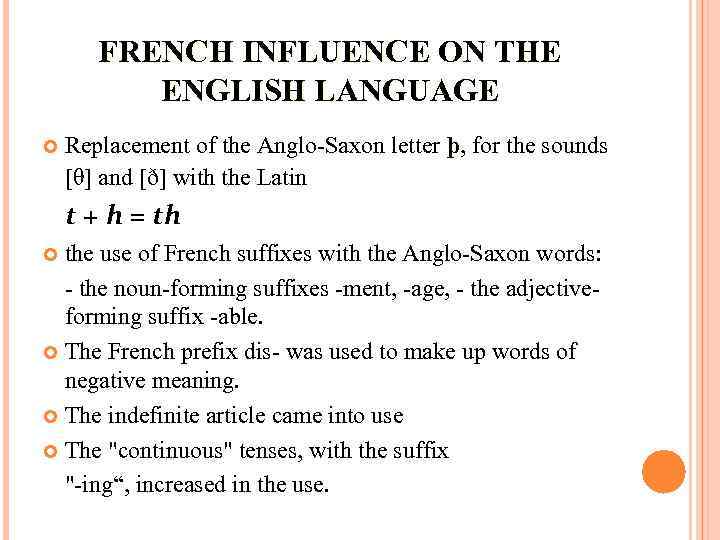 FRENCH INFLUENCE ON THE ENGLISH LANGUAGE Replacement of the Anglo-Saxon letter þ, for the sounds [θ] and [ð] with the Latin t + h = th the use of French suffixes with the Anglo-Saxon words: - the noun-forming suffixes -ment, -age, - the adjectiveforming suffix -able. The French prefix dis- was used to make up words of negative meaning. The indefinite article came into use The "continuous" tenses, with the suffix "-ing“, increased in the use.
FRENCH INFLUENCE ON THE ENGLISH LANGUAGE Replacement of the Anglo-Saxon letter þ, for the sounds [θ] and [ð] with the Latin t + h = th the use of French suffixes with the Anglo-Saxon words: - the noun-forming suffixes -ment, -age, - the adjectiveforming suffix -able. The French prefix dis- was used to make up words of negative meaning. The indefinite article came into use The "continuous" tenses, with the suffix "-ing“, increased in the use.
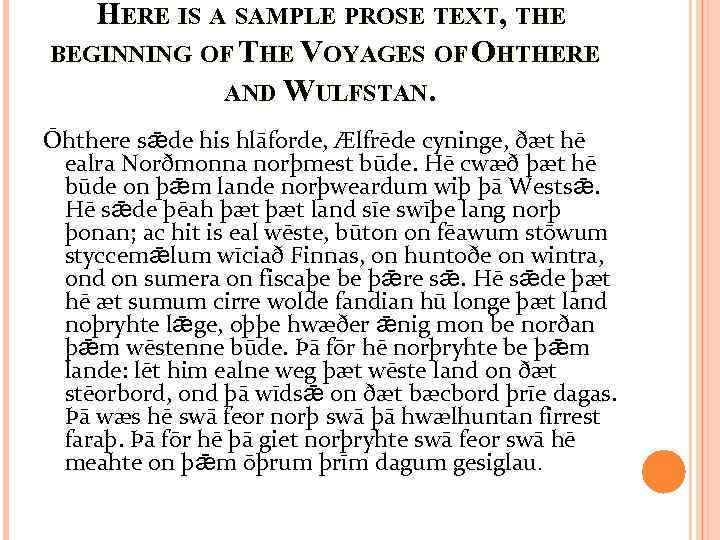 HERE IS A SAMPLE PROSE TEXT, THE BEGINNING OF THE VOYAGES OF OHTHERE AND WULFSTAN. Ōhthere sǣde his hlāforde, Ælfrēde cyninge, ðæt hē ealra Norðmonna norþmest būde. Hē cwæð þæt hē būde on þǣm lande norþweardum wiþ þā Westsǣ. Hē sǣde þēah þæt land sīe swīþe lang norþ þonan; ac hit is eal wēste, būton on fēawum stōwum styccemǣlum wīciað Finnas, on huntoðe on wintra, ond on sumera on fiscaþe be þǣre sǣ. Hē sǣde þæt hē æt sumum cirre wolde fandian hū longe þæt land noþryhte lǣge, oþþe hwæðer ǣnig mon be norðan þǣm wēstenne būde. Þā fōr hē norþryhte be þǣm lande: lēt him ealne weg þæt wēste land on ðæt stēorbord, ond þā wīdsǣ on ðæt bæcbord þrīe dagas. Þā wæs hē swā feor norþ swā þā hwælhuntan firrest faraþ. Þā fōr hē þā giet norþryhte swā feor swā hē meahte on þǣm ōþrum þrīm dagum gesiglau.
HERE IS A SAMPLE PROSE TEXT, THE BEGINNING OF THE VOYAGES OF OHTHERE AND WULFSTAN. Ōhthere sǣde his hlāforde, Ælfrēde cyninge, ðæt hē ealra Norðmonna norþmest būde. Hē cwæð þæt hē būde on þǣm lande norþweardum wiþ þā Westsǣ. Hē sǣde þēah þæt land sīe swīþe lang norþ þonan; ac hit is eal wēste, būton on fēawum stōwum styccemǣlum wīciað Finnas, on huntoðe on wintra, ond on sumera on fiscaþe be þǣre sǣ. Hē sǣde þæt hē æt sumum cirre wolde fandian hū longe þæt land noþryhte lǣge, oþþe hwæðer ǣnig mon be norðan þǣm wēstenne būde. Þā fōr hē norþryhte be þǣm lande: lēt him ealne weg þæt wēste land on ðæt stēorbord, ond þā wīdsǣ on ðæt bæcbord þrīe dagas. Þā wæs hē swā feor norþ swā þā hwælhuntan firrest faraþ. Þā fōr hē þā giet norþryhte swā feor swā hē meahte on þǣm ōþrum þrīm dagum gesiglau.
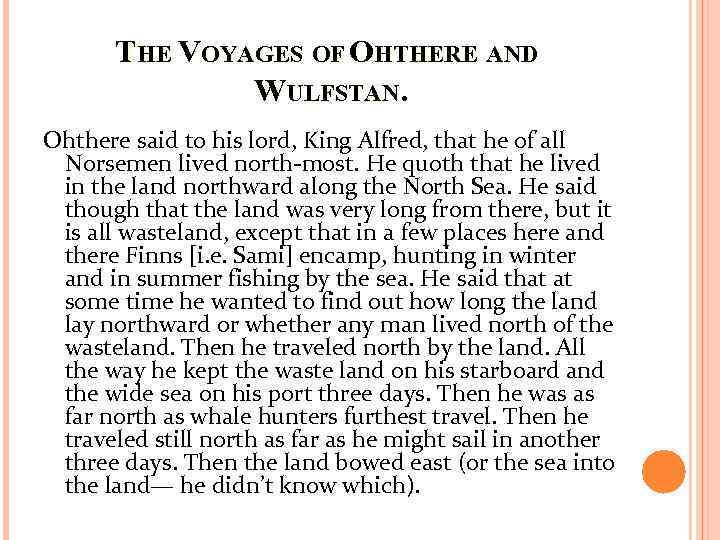 THE VOYAGES OF OHTHERE AND WULFSTAN. Ohthere said to his lord, King Alfred, that he of all Norsemen lived north-most. He quoth that he lived in the land northward along the North Sea. He said though that the land was very long from there, but it is all wasteland, except that in a few places here and there Finns [i. e. Sami] encamp, hunting in winter and in summer fishing by the sea. He said that at some time he wanted to find out how long the land lay northward or whether any man lived north of the wasteland. Then he traveled north by the land. All the way he kept the waste land on his starboard and the wide sea on his port three days. Then he was as far north as whale hunters furthest travel. Then he traveled still north as far as he might sail in another three days. Then the land bowed east (or the sea into the land— he didn’t know which).
THE VOYAGES OF OHTHERE AND WULFSTAN. Ohthere said to his lord, King Alfred, that he of all Norsemen lived north-most. He quoth that he lived in the land northward along the North Sea. He said though that the land was very long from there, but it is all wasteland, except that in a few places here and there Finns [i. e. Sami] encamp, hunting in winter and in summer fishing by the sea. He said that at some time he wanted to find out how long the land lay northward or whether any man lived north of the wasteland. Then he traveled north by the land. All the way he kept the waste land on his starboard and the wide sea on his port three days. Then he was as far north as whale hunters furthest travel. Then he traveled still north as far as he might sail in another three days. Then the land bowed east (or the sea into the land— he didn’t know which).
 THANK YOU FOR YOUR ATTENTION!
THANK YOU FOR YOUR ATTENTION!


